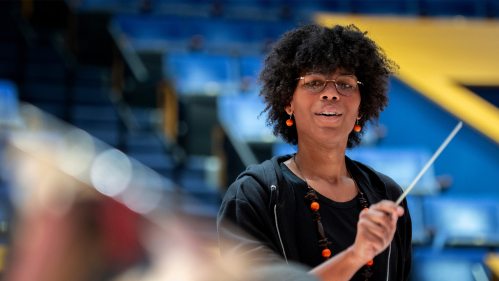Rutgers Senior Gives Voice to Queer Musicians and Their Allies Through New Ensemble

Mal Malone knew she was a musician long before she knew she was a trans woman.
Nearly a decade after picking up the recorder in elementary school, the Mason Gross School of the Arts bass trombone player embraced her full identity as a queer musician last year.
After coming out, Malone felt empowered to take on a new challenge: cofounding Rutgers Rainbow Symphony, the university’s first collective of all queer musicians and allies performing music by queer and other underrepresented composers. Their second performance is scheduled for April 13 at Nicholas Music Center.
“This is a piece of the puzzle I’d been missing for a while,” said Malone, 21, now a senior who is graduating in May with a BM in music performance. “I’ve grown into myself more as I’ve taken on this leadership position in Rainbow Symphony.”
Her friend and cofounder, Brian Yumiguano, 22, who has had a front-row seat to Malone’s trajectory at Rutgers as an artist and trans woman, said she’s flourished in the role of musical director and conductor for the new ensemble.

“Before Rainbow Symphony, she was still exploring her gender and everything that comes with that, but in the last year I did see her really delve into being a trans person – especially in our field, where there aren’t a lot of women to begin with, let alone queer people,” said Yumiguano, a junior music education major who plays the French horn and identifies as nonbinary.
The pair first formed a Queer Quintet on a whim in the fall of 2022 around the time Malone came out. The informal collective of five queer brass musicians specifically sought out arrangements by queer composers.
“I’ve been playing band music since middle school, and one of the striking things I notice is that we are just playing music by straight white men,” said Malone. “There’s a lot of established people in the band repertoire, and these are the safe people who get programmed instead of people digging for new options."
Watch the Rutgers Rainbow Symphony rehearse for its April 13 performance.
While queer composers are hardly a rarity, they – along with female and underrepresented composers – do tend to be less visible in the canon of classical music, said Associate Director of University Bands Julia Baumanis, who co-advises Rainbow Symphony with Todd Nichols, director of university bands.
“What we are talking about is who was hired and who was given a chance. It’s all these stereotypes and strange social constructs that have kept people marginalized in these areas,” Baumanis said. “Until the scales are adjusted and equity is achieved, we must celebrate and do more to include those who have been historically marginalized.”
The group’s shared goal of intentional representation is why Nichols refers to Rainbow Symphony as “an ensemble of purpose.”
“For me it’s a beautiful celebration of those in the LGBTQIA+ community and allies of the community,” Nichols said. “It’s a safe space where your voice is amplified, and you can come together and not only celebrate these composers and musicians but expose them to a wider audience so that more people can be aware of this great music.”
The first Queer Quintet experience was such an “uplifting” experience, said Malone, that the group was considering an expansion by the summer.
“We just wanted to take that idea and put it on a bigger scale,” she said. “The brass quintet seemed like something that would stop after me and the other trombone players graduated. We wanted to create something that would have a lasting legacy.”
The quintet put out feelers among all the existing ensembles at Rutgers. As a member of eight other groups at Rutgers – Marching Scarlet Knights, Symphony Band, Jazz Ensemble 1 and 2, Scarlet Knights Jazz Trombones, Rutgers Trombone Choir, Latin American Chamber Music Ensemble, and Rutgers Sinfonia – Malone made the most of her established connections.
By fall, they had more than 40 queer musicians and allies on board, and the collective Rainbow Symphony was born. Yumiguano took on the role of group president, handling communications and paperwork, while Malone guided the group musically.
“I’ve gained a lot of sympathy for the people who I’ve seen on the podium in my life,” she said. “I never realized how much work you have to put in to run an ensemble officially and well.”
The pair said they feel seen and safe at Rutgers, but that growing incidents of violence and bias toward the queer community do weigh on them and were instrumental in their decision to form this group.
“Queer people and trans people are being attacked for just being who they are,” said Yumiguano. “We are taking space that wasn’t available to us before.”
Their first performance in November featured works by underrepresented composers – including those who are queer, women or Black, brown and indigenous. Malone, who did a majority of the conducting, said the performance left her feeling energized.
“Usually, the second I’m done with a performance, it’s like a massive weight has been lifted off my shoulders,” she said. “But this time, when I got to take a moment to relish all the work that had gone into it and the wonderful outcomes I was really happy. It gave me the momentum to push and make it an even better concert this semester.”


